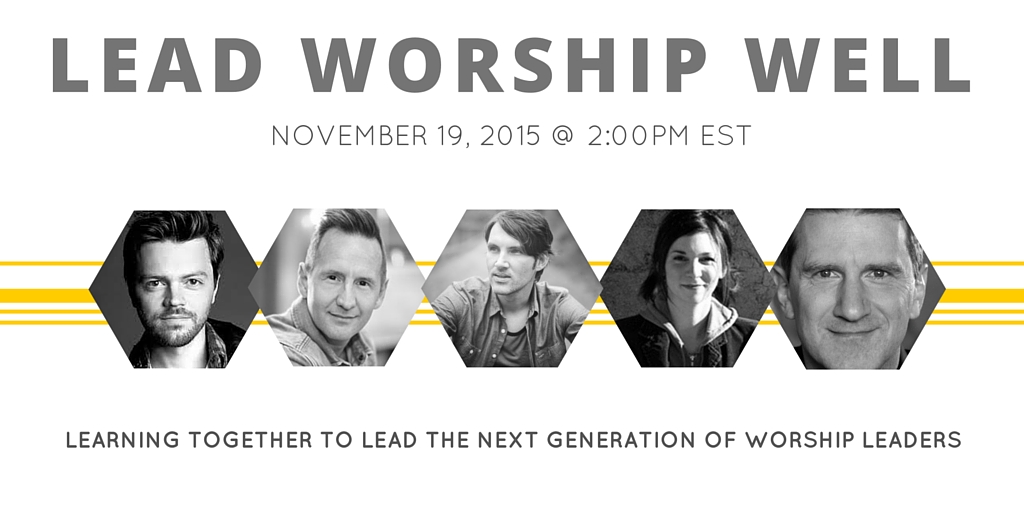How You Can Put Songs Together In A Powerful Way | By Todd Fields
We’re going to talk today about how to put songs together in a powerful way. This is not only about picking the right songs, but also about how to put them together in a way that moves hearts.
We’re going to do it by crafting a set.
C-R-A-F-T
Super easy to remember.
Choose Powerful Songs
How do you know what a powerful song is? For most people, choosing a song is like flipping a coin. We say, “Hey, we did this a couple of weeks ago. Let’s just play it again.”
I want to challenge you in your service planning: if you’re not choosing the right songs, it could be a detriment to reaching people this coming Sunday.
How do you know if a song is powerful? It brings out emotion. Emotion is a big part of music. It’s one of the tools we’ve given by God to use week after week in church.
Music uses melodies that are beautiful to help point people to God. We want to be good stewards of that by using our hearts to prepare and our heads to think. Do the songs you choose bring out emotion? If they don’t, you need to reevaluate.
Do the songs you choose move you privately? Whether you’re driving in your car, spending time with God, or testing songs with your team, do they move you personally?
Do they move everyone corporately? When you test a song in church, do you sense that everybody is jumping in? Are you hearing good feedback after you sing it? Are people asking, “Man, what was that song? Where can I get that?” That’s a great indicator that you’ve chosen the right song.
Side note: Don’t forget hymns. They’re already proven. Most of them are highly emotional. Why? Because they connect us to a point in our past. As we’ll emphasize over and over in Service Rocket, we care about the people coming into your churches every week. We care about the people who will give your church one shot and may not come back. Choosing hymns is a great way to tie in their past and elicit emotion.
Choose songs that are singable. Sometimes songs move our heart and emotions, but we just can’t sing them. There are too many words, or it’s too difficult to keep up from a vocal or lyric standpoint.
Are other churches doing the songs that we sing? It’s a great way to find out whether you’re singing the right songs. Get online and go to CCLI if you’ve never been there. You can find the top 20 songs or top 100 songs that churches all over the world are doing. There’s a reason why they’re doing them.
Run By and Run Through
We want to run our songs by the worship leader. This is huge to me because I’m a worship leader. For a lot of us, we sometimes find ourselves in environments where planning teams select the songs we’re going to sing. They just hand them to us. I think there’s a better way. I want to encourage you to involve the worship leader and run your songs by him or her.
If you’re a pastor watching today and you’ve gotten into the habit of saying, “I think I’m just going to choose the worship songs,” that’s one way to do it. I would encourage you, however, to be a little bit more open-handed. Invite the opinion of your worship leader. I believe that the person who’s going to sing the song into the microphone needs to be involved in choosing the song. Why? Because the song has to move their heart.
If song selection doesn’t come from the heart, it won’t be as powerful.
It has to come from what’s moving your worship leader and the team. If we don’t let worship leaders lead, then they become worship puppets. I know that’s a harsh phrase, but I’ve experienced it. As your team is crafting the set, I beg of you to involve your worship leader. It’s going to be way more powerful. If it’s not moving the worship leader, it won’t move the audience.
Second, run through the flow. When I’m involved with a team putting a set together, I get my acoustic guitar out. I actually run through the songs, one by one, to see if things are starting to come together. I want to see if the songs we’ve chosen connect well into each other. Play the song flow down with acoustic guitar or piano. If you’re not a guitar player or a piano player, find someone who is and allow them to be a part of the set-crafting team.
I love this quote from my friend Chris Tomlin, “Song sets are like a river. We want the flow to take people somewhere.” As you’re crafting your set, just imagine that. From choosing the very first song to the last, you’re inviting people into a song flow, not just three or four random songs. The goal isn’t just playing songs down for people. The goal is to create a fluid journey that includes potential detours that lead people to new moments. Moments are huge.
Aware Of
We have to be aware—that’s our third word in C.R.A.F.T. We have to be aware of repetition through the weeks. People who come to your church service are not living in worship land. Most of them aren’t listening to worship music in their cars. They’re not hearing the songs that we hear over and over again. We have to repeat. You can definitely overdo it, but remember that repetition throughout the weeks is good.
As you craft your set, staying in theme is great, but never do it if it sacrifices the power of the song.
For years in service planning, people would say, “The pastor is talking about faith this Sunday. Todd, that means we need to put together a set that’s all about faith.” It sounds good, but I’ve come to believe that when we have a moment to lead people in singing, we should lead people in singing. It’s a head thing and a heart thing. If we’re only thinking about the subject matter, we’re only connecting with the head. We’ve got to remember that we’re connecting minds and hearts. We want to choose powerful songs, even if they sometimes don’t match the subject matter.
Remember as you craft your set that keeping songs in the same key helps create smooth transitions. It seems like so many songs nowadays are in the key of B. Worship leaders often call B “the key of worship.” When possible, let that be one of the things you think about as you go from song one to song two, song two to song three, etc. What key are we in? Can we stay in that key? Quick pointer: if you’re in the key of B and need to stay there, move to a song in the key of B that a female singer can lead next. So even though you stay in the same key, you can incorporate variety with different voices.
Keep it moving smoothly. The biggest problem for most churches is stop/start between songs. Transitions have to be fluid. I always say that you live and you die by the way you transition between songs.
Paying attention to key and tempo can help smooth things out. If we don’t transition smoothly with the music, it causes disruption for people.
Feel Out The Set
Make sure the set you’re crafting feels right. Does it feel predictable? Does it feel like you’re doing the same thing you do every week? This is one of the most common things I see in churches around the country: they start up-tempo every week. That’s great because we want to wake people up, but when things are predictable, impact goes down.
One of the simplest things you can do that will absolutely breathe life into the way you craft a set is flip it upside down.
It may seem strange, but if you do it the right way, it can be powerful. If you’re used to starting upbeat and loud, plan a couple of weeks in advance to start with something down and slow. Pick a song that everybody knows. Something like “How Great Thou Art” with just an acoustic guitar or piano. People want to sing, but oftentimes we barrage them with our way of doing things and that’s the only way we see it. Consider flipping and beginning down once every few months.
Tag
I’m super excited about this. A tag is any chorus or bridge of a song that can be connected to another for the purpose of emphasizing a current song or creating a new moment. Historically, we only think of crafting a set as song one, song two, song three, etc. If you only think in songs, I want to open your mind to the idea of tags.
Tags move people to encounter God because it gets us out of the normal “Sing one song and stop” mentality. Tags create moments. Tags create unexpected detours that provide fresh encounters for people. Tags create emphasis. They emphasize a theme or point by lingering in a place that we’re already at with a current song.
This is the goal of my heart for you: we all have to craft song sets every Sunday. We all have to answer the question, “What are we going to sing?”
If you and your team don’t have that “this is going to so powerful” thought coming into your service, then it’s not going to be powerful. If you’re not excited about it, if it’s not moving your heart or your team’s heart, then it’s not going to be powerful for the people.
I’m really excited to invite you to our next Lead Worship Well event. Steve Fee, Kim Walker-Smith, and Martin Smith are a few of the guests who will be joining us for this training. You don’t want to miss it.

